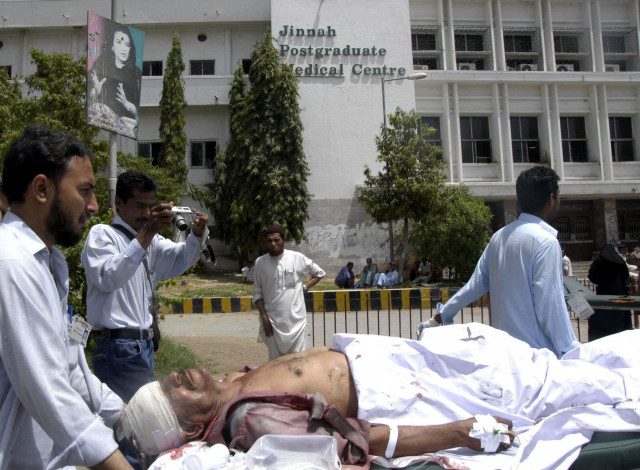A lifetime of commitment: Patients, others laud JPMC’s role as city's frontline hospital
The facility has been serving the city and province for the last six decades.

"I was brought to the hospital without any attendant but the staff looked after me as if I was their own family member," Patient, Asad Ameer Hussain. PHOTO: AGENCIES/FILE
Karachi is an unpredictable city. In the face of this unpredictability, the one place that people have always looked towards is the Jinnah Postgraduate Medical Centre (JPMC).
The facility has served as a lifeline to the people of the city when they are most vulnerable. The treatment it offers, irrespective of the patients' class or creed, is what sets it apart from other facilities in the country.

At the 'Golden Jubilee Annual Medical Symposium' held at the hospital's premises on Monday, law enforcement officials, ambulance service providers, media persons and patients lauded the facilities, services and commitment of the doctors and paramedical staff working at the JPMC.
The week-long celebrations comprised presentations of papers on various diseases as well as discussions on the hospital's importance and its contribution to the city and the province over the last six decades.
The theme of the celebrations was '50 Years of Research and Development: A Continuous Pledge to Serve'. In the words of JPMC's executive director, Prof Tasnim Ahsan, "We are the frontline hospital for any mass disaster in the city and this is because of our hard-earned reputation."
Patients and their attendants usually criticise the facilities at the centre but at the closing ceremony of the event, most of them appreciated the hospital's role, saying it was like a private hospital in terms of the quality of patient care.
"I was brought to the hospital without any attendant but the staff looked after me as if I was their own family member," said a patient, Asad Ameer Hussain, who was brought to JPMC with a gunshot wound. Mrs Lal Majeed, whose servant was brought to the hospital, said that the staff was well-aware of the patients' needs.

"The city lacks a central command and control system during any disaster or emergency," pointed out the joint executive director and JPMC emergency ward incharge, Dr Seemin Jamali. She stressed that the rights of the patients were very important for the JPMC staff. The emergency ward is often disturbed by VIP movements. "Security is our main concern," she added.
Appreciating the role of the facility during any emergency, Motorway DIG AD Khwaja and Prof Jafar Naqvi praised the dedicated staff at the emergency ward. "Whatever the situation in the city, the staff are always seen busy serving patients," said Khwaja.
District South DIG Abdul Khalique and SSP Nasir Aftab represented the law enforcement agencies and appreciated the role of the hospital, assuring the staff of their continued support.
Ramzan Chhipa, head of the Chhipa Welfare Association, Dr Junaid Razzak of the Aga Khan Hospital, Dr Nighat Farooqui of Civil Hospital, Karachi, and media persons also spoke at the closing ceremony.
Speaking on the importance of 'Public Private Partnership [P3]', Prof Ahsan said that it had been a buzzword for the last couple of decades. "This mode of development is being exercised throughout the world. The P3 sponsored development changed the face and functioning of this hospital. In our case, the partnerships have all been fostered from the moral and humanitarian standpoint, with the ultimate beneficiary being the patient."
Published in The Express Tribune, April 2nd, 2014.


















COMMENTS
Comments are moderated and generally will be posted if they are on-topic and not abusive.
For more information, please see our Comments FAQ